| Listing 1 - 10 of 27 | << page >> |
Sort by
|
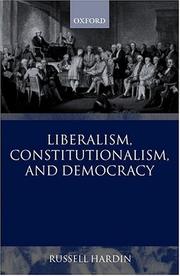
ISBN: 0198290845 9780198290841 Year: 1999 Publisher: Oxford Oxford University Press
Abstract | Keywords | Export | Availability | Bookmark
 Loading...
Loading...Choose an application
- Reference Manager
- EndNote
- RefWorks (Direct export to RefWorks)
Political systems --- Theory of the state --- Legal theory and methods. Philosophy of law --- United States --- Democracy --- Liberalism --- Constitutional history --- Constitutional history - United States --- United States of America

ISBN: 080182818X 0801828198 1138151246 1135433097 113543302X 1315044331 9780801828195 9780801828188 Year: 1993 Publisher: Baltimore, Md Johns Hopkins University Press
Abstract | Keywords | Export | Availability | Bookmark
 Loading...
Loading...Choose an application
- Reference Manager
- EndNote
- RefWorks (Direct export to RefWorks)
Social choice --- Microeconomics --- Operational research. Game theory --- Social psychology --- Social choice. --- Choix collectif. --- Collectieve keuze. --- Choice, Social --- Collective choice --- Public choice --- Choice (Psychology) --- Welfare economics
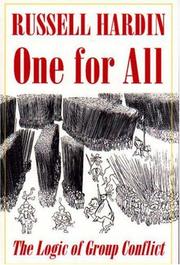
ISBN: 0691043507 Year: 1995 Publisher: Princeton (N.J.): Princeton university press
Abstract | Keywords | Export | Availability | Bookmark
 Loading...
Loading...Choose an application
- Reference Manager
- EndNote
- RefWorks (Direct export to RefWorks)
Social conflict --- Social groups --- Conflits sociaux --- Groupes, Dynamique des --- 316.35 --- Association --- Group dynamics --- Groups, Social --- Associations, institutions, etc. --- Social participation --- Class conflict --- Class struggle --- Conflict, Social --- Social tensions --- Interpersonal conflict --- Social psychology --- Sociology --- Sociale groepen. Sociologie van de groep --- Social conflict. --- Social groups. --- 316.35 Sociale groepen. Sociologie van de groep

ISBN: 9780871543646 9780871543509 0871543648 0871543508 Year: 2004 Volume: 8 Publisher: New York Russell Sage Foundation
Abstract | Keywords | Export | Availability | Bookmark
 Loading...
Loading...Choose an application
- Reference Manager
- EndNote
- RefWorks (Direct export to RefWorks)
If trust is sometimes the rational response in interpersonal relations, then it can also be rational to distrust. Indeed, distrust is the preferred response when it protects against harm―as when parents do not entrust the safety of their child to a disreputable caretaker. Liberal political theory was largely founded on distrust of government, and the assumption that government cannot and should not be trusted led the framers of the U.S. constitution to establish a set of institutions explicitly designed to limit government power. With contributions from political science, anthropology, economics, psychology, and philosophy, Distrust examines the complex workings of trust and distrust in personal relationships, groups, and international settings. Edna Ullman-Margalit succinctly defines distrust as the negation of trust, and examines the neutral state between the two responses in interpersonal relations. As Margalit points out, people typically defer judgment―while remaining mildly wary of another's intentions―until specific grounds for trust or distrust become evident. In relations between nations, misplaced trust can lead to grievous harm, so nations may be inclined to act as though they distrust other nations more than they actually do. Editor Russell Hardin observes that the United States and the former Soviet Union secured a kind of institutionalized distrust―through the development of the nuclear deterrent system―that stabilized the relationship between the two countries for four decades. In another realm where distrust plays a prominent role, Margaret Levi, Matthew Moe, and Theresa Buckley show that since the National Labor Relations Board has not been able to overcome distrust between labor unions and employers, it strives to equalize the power held by each group in negotiations. Recapitulating liberal concerns about state power, Patrick Troy argues that citizen distrust keeps government regulation under scrutiny and is more beneficial to the public than unconditional trust. Despite the diversity of contexts examined, the contributors reach remarkably similar conclusions about the important role of trust and distrust in relations between individuals, nations, and citizens and their governments. Distrust makes a significant contribution to the growing field of trust studies and provides a useful guide for further research.
Trust. --- Confiance --- #SBIB:35H500 --- 316.4.052 --- Bestuur en samenleving: algemene werken --- Integrerende processen. Sociale controle. Sociale sancties --- 316.4.052 Integrerende processen. Sociale controle. Sociale sancties --- Trust --- Trust (Psychology) --- Attitude (Psychology) --- Emotions --- Interpersonal relations
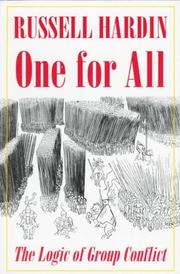
ISBN: 0691048258 9786612457784 140082169X 1282457780 9780691048253 Year: 1997 Publisher: Princeton (N.J.) Princeton university press
Abstract | Keywords | Export | Availability | Bookmark
 Loading...
Loading...Choose an application
- Reference Manager
- EndNote
- RefWorks (Direct export to RefWorks)
In a book that challenges the most widely held ideas of why individuals engage in collective conflict, Russell Hardin offers a timely, crucial explanation of group action in its most destructive forms. Contrary to those observers who attribute group violence to irrationality, primordial instinct, or complex psychology, Hardin uncovers a systematic exploitation of self-interest in the underpinnings of group identification and collective violence. Using examples from Mafia vendettas to ethnic violence in places such as Bosnia and Rwanda, he describes the social and economic circumstances that set this violence into motion. Hardin explains why hatred alone does not necessarily start wars but how leaders cultivate it to mobilize their people. He also reveals the thinking behind the preemptive strikes that contribute to much of the violence between groups, identifies the dangers of "particularist" communitarianism, and argues for government structures to prevent any ethnic or other group from having too much sway. Exploring conflict between groups such as Serbs and Croats, Hutu and Tutsi, Northern Irish Catholics and Protestants, Hardin vividly illustrates the danger that arises when individual and group interests merge. In these examples, groups of people have been governed by movements that managed to reflect their members' personal interests--mainly by striving for political and economic advances at the expense of other groups and by closing themselves off from society at large. The author concludes that we make a better and safer world if we design our social institutions to facilitate individual efforts to achieve personal goals than if we concentrate on the ethnic political makeup of our respective societies.
Social groups --- Social conflict --- 316.35 --- #SBIB:327.5H20 --- 316.45 --- Association --- Group dynamics --- Groups, Social --- Associations, institutions, etc. --- Social participation --- Class conflict --- Class struggle --- Conflict, Social --- Social tensions --- Interpersonal conflict --- Social psychology --- Sociology --- Sociale groepen. Sociologie van de groep --- Vredesonderzoek: algemeen --- Sociale groepen. Groepsprocessen. Kleine groepen. Interactionele groepsdynamiek --- 316.45 Sociale groepen. Groepsprocessen. Kleine groepen. Interactionele groepsdynamiek --- 316.35 Sociale groepen. Sociologie van de groep --- Social conflict. --- Social groups -- Decision making. --- Social groups. --- Sociology & Social History --- Social Sciences --- Social Change
Book
ISBN: 0226316181 9780226316185 Year: 1988 Publisher: Chicago (Ill.): University of Chicago press
Abstract | Keywords | Export | Availability | Bookmark
 Loading...
Loading...Choose an application
- Reference Manager
- EndNote
- RefWorks (Direct export to RefWorks)
Ethics --- Social ethics --- Utilitarianism --- Éthique --- --Utilitarisme --- --Ethics --- Hedonism --- Philosophy --- Social problems --- Sociology --- Deontology --- Ethics, Primitive --- Ethology --- Moral philosophy --- Morality --- Morals --- Philosophy, Moral --- Science, Moral --- Values --- Ethics. --- Social ethics. --- Utilitarianism. --- --Ethics. --- Utilitarisme
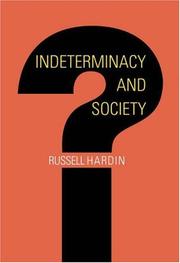
ISBN: 0691091765 0691123926 1400848962 9781400848966 9780691123929 9780691091761 Year: 2013 Publisher: Princeton, NJ
Abstract | Keywords | Export | Availability | Bookmark
 Loading...
Loading...Choose an application
- Reference Manager
- EndNote
- RefWorks (Direct export to RefWorks)
In simple action theory, when people choose between courses of action, they know what the outcome will be. When an individual is making a choice "against nature," such as switching on a light, that assumption may hold true. But in strategic interaction outcomes, indeterminacy is pervasive and often intractable. Whether one is choosing for oneself or making a choice about a policy matter, it is usually possible only to make a guess about the outcome, one based on anticipating what other actors will do. In this book Russell Hardin asserts, in his characteristically clear and uncompromising prose, "Indeterminacy in contexts of strategic interaction . . . Is an issue that is constantly swept under the rug because it is often disruptive to pristine social theory. But the theory is fake: the indeterminacy is real." In the course of the book, Hardin thus outlines the various ways in which theorists from Hobbes to Rawls have gone wrong in denying or ignoring indeterminacy, and suggests how social theories would be enhanced--and how certain problems could be resolved effectively or successfully--if they assumed from the beginning that indeterminacy was the normal state of affairs, not the exception. Representing a bold challenge to widely held theoretical assumptions and habits of thought, Indeterminacy and Society will be debated across a range of fields including politics, law, philosophy, economics, and business management.
Social interaction --- Choice (Psychology) --- Determinism (Philosophy) --- Social interaction. --- Human interaction --- Interaction, Social --- Symbolic interaction --- Philosophy --- Psychology --- Exchange theory (Sociology) --- Social psychology
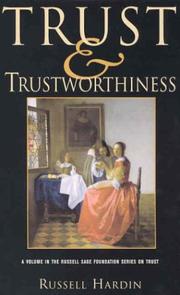
ISBN: 0871543427 0871543419 9780871543417 9780871543424 Year: 2002 Volume: 4 Publisher: New York : Russell Sage Foundation,
Abstract | Keywords | Export | Availability | Bookmark
 Loading...
Loading...Choose an application
- Reference Manager
- EndNote
- RefWorks (Direct export to RefWorks)
What does it mean to "trust?" What makes us feel secure enough to place our confidence--even at times our welfare--in the hands of other people? Is it possible to "trust" an institution? What exactly do people mean when they claim to "distrust" their governments? As difficult as it may be to define, trust is essential to the formation and maintenance of a civil society. In Trust and Trustworthiness political scientist Russell Hardin addresses the standard theories of trust and articulates his own new and compelling idea: that much of what we call trust can be best described as "encapsulated interest." Research into the roles of trust in our society has offered a broad range of often conflicting theories. Some theorists maintain that trust is a social virtue that cannot be reduced to strategic self-interest; others claim that trusting another person is ultimately a rational calculation based on information about that person and his or her incentives and motivations. Hardin argues that we place our trust in persons whom we believe to have strong reasons to act in our best interests. He claims that we are correct when we assume that the main incentive of those whom we trust is to maintain a relationship with us--whether it be for reasons of economic benefit or for love and friendship. Hardin articulates his theory using examples from a broad array of personal and social relationships, paying particular attention to explanations of the development of trusting relationships. He also examines trustworthiness and seeks to understand why people may behave in ways that violate their own self-interest in order to honor commitments they have made to others. The book also draws important distinctions between vernacular uses of "trust" and "trustworthiness," contrasting, for example, the type of trust (or distrust) we place in individuals with the trust we place in institutions Trust and Trustworthiness represents the culmination of important new research into the roles of trust in our society; it offers a challenging new voice in the current discourse about the origins of cooperative behavior and its consequences for social and civic life.
Trust --- Reliability --- Interpersonal relations --- #SBIB:309H021 --- #SBIB:17H20 --- 316 --- Human relations --- Interpersonal relationships --- Personal relations --- Relations, Interpersonal --- Relationships, Interpersonal --- Social behavior --- Social psychology --- Object relations (Psychoanalysis) --- Dependability --- Trustworthiness --- Conduct of life --- Trust (Psychology) --- Attitude (Psychology) --- Emotions --- Intra- en interpersonele communicatie --- Sociale wijsbegeerte: algemeen --- Sociologie --(algemeen) --- 316 Sociologie --(algemeen) --- Interpersonal relations. --- Reliability. --- Trust. --- Fiabilité --- Confiance --- Ethique sociale --- Relations interpersonnelles
Book
ISBN: 9780691137551 0691137552 9781400830664 9786612449352 0691162220 1282449354 1400830664 9781282449350 Year: 2009 Publisher: Princeton Princeton university
Abstract | Keywords | Export | Availability | Bookmark
 Loading...
Loading...Choose an application
- Reference Manager
- EndNote
- RefWorks (Direct export to RefWorks)
Hardin presents an essentially economic account of what an individual can come to know and then applies this account to many areas of ordinary life: political participation, religious beliefs, popular knowledge of science, liberalism, culture, extremism, moral beliefs, and institutional knowledge
Prise de décision --- Sociologie de la connaissance --- Interaction sociale --- Théorie de la connaissance --- Knowledge, Theory of. --- Knowledge, Sociology of. --- Decision making. --- Social interaction. --- Knowledge, Theory of --- -Knowledge, Sociology of --- -Decision making --- -Social interaction --- -306.42 --- Human interaction --- Interaction, Social --- Symbolic interaction --- Exchange theory (Sociology) --- Psychology --- Social psychology --- Deciding --- Decision (Psychology) --- Decision analysis --- Decision processes --- Making decisions --- Management --- Management decisions --- Choice (Psychology) --- Problem solving --- Knowledge, Theory of (Sociology) --- Sociology of knowledge --- Communication --- Public opinion --- Sociology --- Social epistemology --- Epistemology --- Theory of knowledge --- Philosophy --- Electronic information resources --- Decision making --- E-books --- Knowledge, Sociology of --- Social interaction --- Speculative Philosophy --- Philosophy & Religion --- 16 --- 174 --- 658.334 --- 338.6 --- Logica. Dialectiek. --- Verband tussen de ethiek en de economie. Ethiek en bedrijf. --- Beroepsvorming en -oriëntatie. Menselijke investeringen. Menselijk kapitaal. --- Wetenschappelijk onderzoek en ontwikkeling. --- Prise de décision. --- Sociologie de la connaissance. --- Interaction sociale. --- Théorie de la connaissance. --- Logica. Dialectiek --- Verband tussen de ethiek en de economie. Ethiek en bedrijf --- Wetenschappelijk onderzoek en ontwikkeling --- Beroepsvorming en -oriëntatie. Menselijke investeringen. Menselijk kapitaal --- Prise de décision. --- Théorie de la connaissance
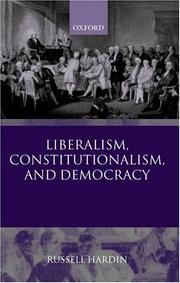
ISBN: 0199261687 Year: 2003 Publisher: Oxford Oxford university press
Abstract | Keywords | Export | Availability | Bookmark
 Loading...
Loading...Choose an application
- Reference Manager
- EndNote
- RefWorks (Direct export to RefWorks)
| Listing 1 - 10 of 27 | << page >> |
Sort by
|

 Search
Search Feedback
Feedback About UniCat
About UniCat  Help
Help News
News